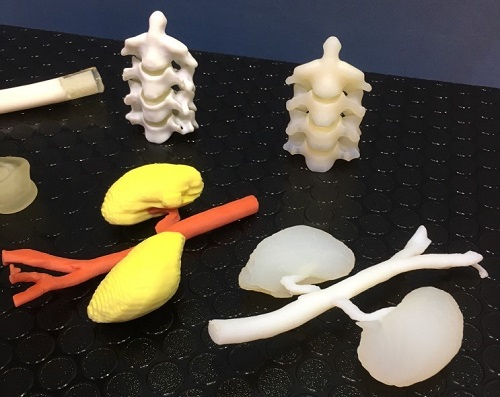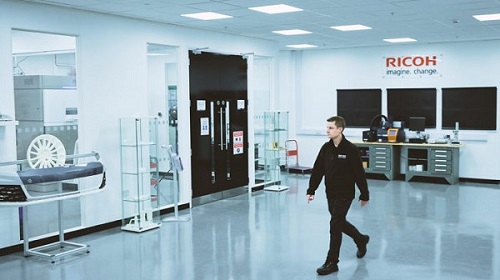Japanese 2D-to-3D printing firm Ricoh is further extending its activities in the additive manufacturing (AM) sector, this time partnering with North Carolina State University to establish a Center of Excellence. This center will serve as a hub for Ricoh’s 3D printing services and as a research center for new applications and methods.

“Ricoh’s Managed 3D-print services will help manufacturers accelerate innovation and product development through rapid, onsite prototyping. As the applications for additive manufacturing grow, adopting an as-a-service model leverages existing onsite 3D-printing expertise and resources to shorten time while minimizing any additional capital investment. Ricoh’s partnership with NC State provides our Managed Services customers with direct access to additive manufacturing best practices and resources they wouldn’t have on their own. We are able to drive efficiencies through our teams onsite, as well as address unique challenges through the COE,” said Ricoh´s Senior Director of Additive Manufacturing, Gary Turner.
“Additive manufacturing has significant potential to reduce supply chain complexity and drive innovation in a myriad of industries. Partnering with a company like Ricoh with its vast onsite network will help prepare students for impactful careers and identify new opportunities to advance research,” said Mark Schmidt, North Carolina State University’s associate vice chancellor for partnerships.
Ricoh’s 3D printing engagements have been rather eclectic. The company has partnered with Axial3D and Stratasys to create a workflow from scan to part for medical models. Additionally, it has collaborated with Materialise to assist hospitals in producing parts using Ricoh’s ISO 13485-certified medical manufacturing center. The firm also has a partnership with IBM on medical models. Ricoh has been a 3D printer distributor since 2014 and is developing aluminum and ceramic binder jetting technologies. The company operates MJF machines and has developed its own powder bed fusion technology. It has manufactured power generators for sewage facilities. Transitioning from becoming a Leapfrog reseller to making medical implants represents a significant evolution for the Japanese firm. From interviews with key Ricoh staffers, Enrico Gallino and Gary Turner, we gained insights, but the company has always maintained a certain level of mystique. It seems that Ricoh has engaged with 3D printing in a very diverse manner over the past decade.

Now, the focus is primarily on its 3D Printing for Healthcare initiative, which centers around medical models but encompasses much more. The concept of offering a complete workflow and 3D printing solution for medical purposes in hospitals is innovative. Many hospitals are already using 3D printing for medical models, as well as patient-specific guides and more, with the sector expected to grow significantly.
By positioning itself as a comprehensive solution with numerous partners, and pursuing difficult-to-obtain clearances, Ricoh is establishing itself as a leader in this space. Its main potential competitors in the software toolchain for hospitals are Materialise and Axial. The company could potentially expand more aggressively into this space. Acquiring Oqton or a combination of Oqton and 3D Systems’ Geomagic assets could position it as a leader in the entire scan-to-file-to-workflow segment. Additionally, acquiring a stake in Materialise could be a logical move. By combining investments in services and software, Ricoh is becoming quite similar to Materialise. Ricoh is a $15 billion revenue company, while Materialise is currently undervalued with a market cap of $300 million. Though it’s generally believed that Fried Vancraen would not sell, a large strategic stake could make sense for Ricoh. However, the company has not made impulsive investments in 3D printing; instead, Ricoh is being thoughtful and focusing on the long term.
In this context, establishing a base in North Carolina, a hub for medical and biotech companies, is very strategic. The Research Triangle alone hosts 600 biotech and medical firms. With institutions like Duke, UNC, and North Carolina State University driving significant medical research, it’s a logical location for Ricoh’s expansion. This move also signifies that the firm is intensifying its focus on medical 3D printing. Ricoh has demonstrated remarkable patience and perseverance in the 3D printing sector for over a decade. This steady approach seems to be paying off as the company deepens its involvement in the medical field. Given Ricoh’s substantial resources and extensive expertise, the company is emerging as a leading figure in medical 3D printing. It remains to be seen whether the team will maintain its cautious pace or accelerate its efforts now that it has a clear direction.
Join us at TCT Asia, connect with industry innovators as you explore the entire AM ecosystem including design, materials, hardware, software, post-processing, and quality. 10,000+ professionals will unite to hear about the latest trends, explore the latest immersive AM technologies and find solutions to their AM challenges. Make sure you are there too.

TCT ASIA 2024
Tuesday 7th May 09:00 - 17:30
Wednesday 8th May 09:00 - 17:30
Thursday 9th May 09:00 - 15:00
NECC(Shanghai)7.1&8.1H